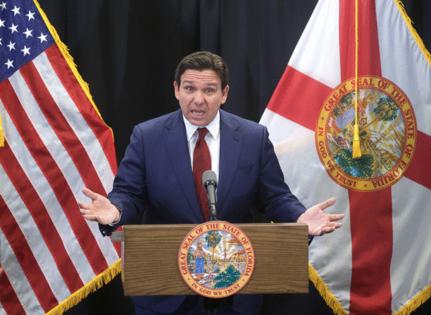Editorial: Why did DeSantis veto a common-sense ethics law?
Published in Op Eds
It can make you dizzy, trying to figure out what is going on inside Gov. Ron DeSantis’ head, particularly when it comes to ethics laws meant to hold Florida’s leaders accountable and in balance.
Throughout his tenure, the governor has made a great show of removing elected officials from public office, often scolding them for ethical violations or gross incompetence. Yet when a bill (HB 1445) landed on his desk, making it illegal for elected and appointed officials to shake down lobbyists for campaign contributions, he whipped out his veto pen.
According to that same veto message, he doesn’t think people appointed to powerful boards should necessarily be residents of the state of Florida — or even citizens of the United States.
At the same time, he apparently thinks it should be a crime for illegal immigrants to set foot in Florida, as described in a new measure (known as SB 4C) that he enthusiastically signed into law earlier this year.
We can’t pretend to understand what the governor was thinking, even with his statements at press conferences and the memo that accompanied the veto of HB 1445. But House and Senate leaders don’t need to read the governor’s mind; they just need to override his nonsensical veto and get this law on the books.
Not for sale
That’s because the legislation made such obvious sense. The people of Florida have the right to expect that public officials won’t use their “official authority or influence” to solicit campaign contributions from lobbyists, especially when a constitutional provision already bans them from obtaining any favors or financial advantage from the public trust they hold.
If anything, HB 1445 didn’t go far enough. It should have explicitly banned politicians from seeking any kind of financial advantage. But the ban on campaign contributions made sense, and would be relatively easy to investigate.
The would-be law includes a section aimed specifically at water management districts — and might have proven a stumbling block for John Miklos, whose tenure as the head of the St. Johns River Water Management District was marred by allegations of special favors for developers seeking to build on environmentally sensitive land. It’s important to note that Miklos has never been charged with any crime. But it makes sense to hold water management officials — who oversee hundreds of millions’ of dollars worth of public land, and award permits that are essential to developers — to high standards of transparency and fairness.
Floridians have a right to know their leaders aren’t selling the power entrusted in them to the highest bidder. It’s a shame DeSantis doesn’t agree. Perhaps the answer lies in a well-sourced story by NBC News, claiming that some of the governor’s staffers were asking lobbyists who had contracts with the state for campaign contributions — and urging them not to contribute to the campaign of Byron Donalds, who is running for governor in 2026. At one time, Casey DeSantis – the governor’s wife — was said to be considering a run herself.
Of the people
State residents also deserve direct representation on powerful boards — such as the state Board of Governors, which oversees the university system, or universities’ individual boards of trustees. Under HB 1445, they would have been required to live in Florida — or at least to have attended a Florida university. The governor took issue with this in his veto message, arguing that “citizen” was too generic to imply that appointees be residents of this state.
As a side note, taxpayers also shouldn’t be paying five-figure commuting costs for high-paid state employees, such as the four high-level Florida IT officials who the Sentinel’s Jeff Schweers discovered were living out of state and had billed Florida for $56,000 in travel expenses.
It’s also worth noting that HB 1445 won all but unanimous approval, from Republicans and Democrats alike, with only one lawmaker (Rep. Matt Caruso, R-West Palm Beach) voting against it.
Certainly, there was some subtext here. The 2025 legislative session marked a sharp departure from DeSantis’ previously tight control of a docile Legislature. It’s certainly possible to see the provisions of the legislation as intentional pokes at the governor’s “do as I say, not as I do,” attitude.
But HB 1445 was a good law, one that made perfect sense. We hope Senate President Ben Albritton and House Speaker Daniel Perez give their members a chance to drive this message home — with a veto override that pushes the bill into law regardless of the governor’s opposition.
_____
©2025 Orlando Sentinel. Visit orlandosentinel.com. Distributed by Tribune Content Agency, LLC.

























































Comments